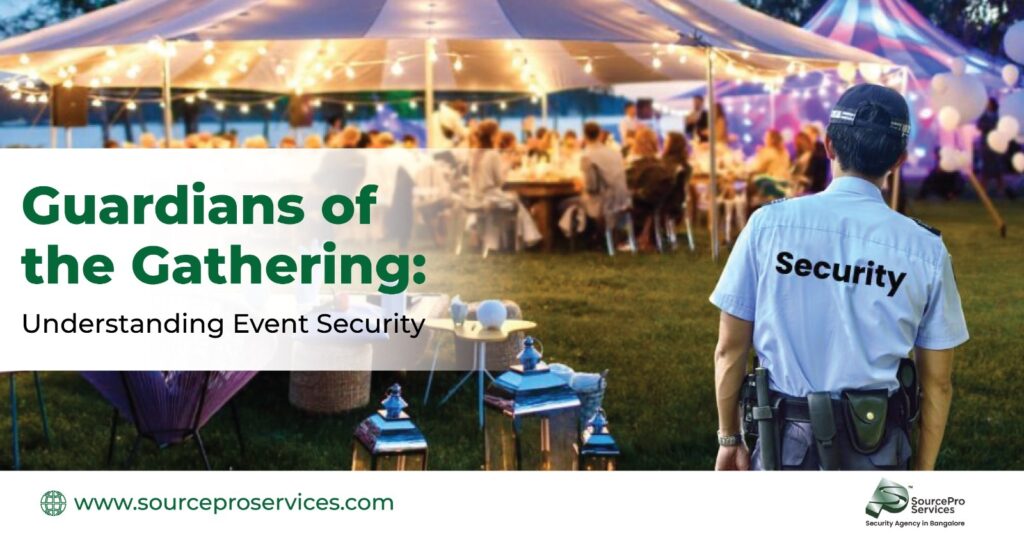Guardians of the Gathering: Understanding Event Security

Key Elements of Event Security Services
Effective event security services is a comprehensive approach covering risk mitigation, crowd control, emergency preparedness, and communication. Here are the fundamental elements that form the backbone of any robust event security plan:
Crowd Management
Crowd management is crucial for maintaining order and safety amidst large gatherings. Skilled security personnel are trained to anticipate crowd behaviour, regulate entry and exit points, manage queues, and disperse crowds in an orderly manner to prevent overcrowding.
Access Control
Access control measures are implemented to regulate the entry of individuals and vehicles into the event venue. This may involve the use of physical barriers, ticketing systems, ID verification, and bag checks to screen attendees.
Risk Assessment and Planning
Thorough risk assessment is essential for identifying potential threats associated with the event. Security professionals conduct site surveys and collaborate to develop a security plan tailored to the specific needs of the event.
Emergency Response Planning
Effective emergency response planning is critical to eliminate unexpected incidents such as medical emergencies and security breaches. Event security teams establish protocols for evacuation procedures, medical assistance and emergency service communication.
Surveillance and Monitoring
Surveillance cameras, security personnel, and technology-enabled monitoring systems play a vital role in enhancing situational awareness and detecting potential security threats. Real-time monitoring allows security teams to proactively address emerging issues and maintain a safe environment.
Communication Systems
Clear and reliable communication systems are essential in coordination among security personnel and event organisers. Two-way radios, mobile phones, and digital communication platforms enable rapid exchange of information and prompt response to incidents.
Understanding the Risks
Events, by their very nature, can be vulnerable to a variety of threats and security challenges. Understanding these risks is essential for effective planning and mitigation strategies. Here are some key aspects to consider:
Common Threats to Events
Events are susceptible to a range of security threats that can jeopardise the safety and success of gatherings:
Physical Security Risks:
Unauthorised access, theft, vandalism, and physical altercations pose immediate dangers to attendees, staff, and property within event venues.
Medical Emergencies:
Health-related incidents or medical emergencies can occur unexpectedly, requiring swift and efficient response mechanisms to ensure the well-being of attendees.
Natural Disasters:
Events held in outdoor or vulnerable venues face risks from natural disasters, necessitating contingency plans for evacuation and safety measures.
Impact of Insufficient Security Measures
Failure to address security risks adequately can lead to severe consequences:
Safety Compromises:
Inadequate security measures increase the risk of accidents and injuries, and violence, undermining the safety and well-being of event participants and stakeholders.
Reputational Damage:
Security incidents tarnish the reputation of event organisers, venues, and sponsors, eroding trust and credibility among attendees, partners, and the broader community.
By recognizing and addressing these common threats event organisers can prioritise proactive risk management strategies to safeguard attendees and improve overall security.
Benefits of Professional Event Security Services
Professional event security services offer a wide range of benefits that contribute to the overall success and safety of events:
Peace of Mind for Organisers
Engaging professional security services provides event organisers with peace of mind, knowing that trained professionals are there to mitigate risks, ensuring compliance with safety regulations. With experienced security personnel in place, organisers can focus on delivering an enjoyable experience for attendees without the burden of security concerns.
Expert Safety for Attendees
The primary goal of event security services is to prioritise the safety and well-being of attendees. By implementing proactive security measures like crowd management protocols, access control systems, and emergency response plans, professional security teams create a secure environment where attendees can feel confident and protected.
Protection of Assets and Property
Events often involve valuable assets, equipment, and property that require protection against theft, vandalism, or damage. Professional event security services employ surveillance systems, perimeter controls, and asset protection measures to safeguard valuable assets and property from potential threats.
By recognizing and leveraging the benefits of professional event security services, organisers can create a safe and secure environment that mitigates potential liabilities.
The Future of Event Security
As the landscape of security threats evolves, so too must the strategies and technologies used to mitigate risks and ensure safety. The future of event security is characterised by innovation, adaptation, and the integration of cutting-edge technologies:
Emerging Technologies in Event Security
Artificial Intelligence (AI):
AI-powered surveillance systems and threat detection algorithms offer real-time analysis of crowd behaviour, facial recognition, and anomaly detection.
Biometric Identification:
Biometric authentication methods like fingerprint scanning and facial recognition are increasingly used for access control and identity verification at events.
Drone Surveillance:
Unmanned aerial vehicles (UAVs) equipped with cameras and sensors enable aerial surveillance of event venues and crowd monitoring from a bird's-eye view.
Adaptation to Changing Threats
Event security professionals must remain vigilant and adaptable in response to evolving threats:
Dynamic Risk Assessment:
Continuous monitoring of emerging threats and vulnerabilities allows security teams to adapt their strategies and protocols.
Collaborative Partnerships:
Collaboration with law enforcement agencies and emergency services gives coordination of response and collective resilience against security threats.
By embracing emerging technologies and adopting proactive, adaptive approaches to security management, the future of event security promises to be both innovative and resilient in safeguarding the well-being and experience of attendees.
